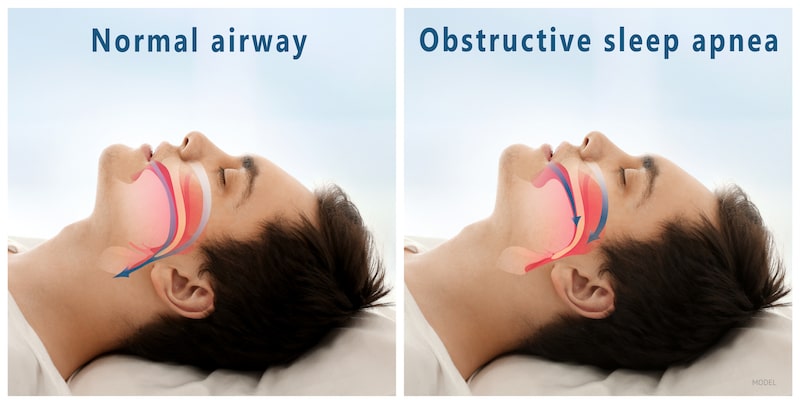3 Minute Read:
Sleep apnea is a worrying condition that can be dangerous and, in some extreme cases, fatal. The condition affects the patient’s airways while sleeping, causing them to stop breathing periodically.
While this concept is frightening enough, sleep apnea can also have a knock-on effect on other areas of life, such as consistent headaches, depression, and mood swings.

For many patients, sleep apnea goes undiagnosed for years, as it is difficult to self-diagnose. Often, patients only realize there’s a problem when their partner brings it to their attention.
Let’s look at the dangers of sleep apnea and how it affects a patient’s health and well-being.
Is Sleep Apnea Dangerous?
Sleep apnea causes individuals to stop breathing while they are asleep. The condition can be very dangerous, especially if it is undiagnosed and untreated.
The brain and body require oxygen to function correctly, and a lack of oxygen can cause many problems.
In most cases, people with sleep apnea wake up a few seconds after they have stopped breathing — so there is little chance for significant damage. Unfortunately, for some, this event could be happening hundreds of times during the night without them being aware of the condition.
How Does Sleep Apnea Affect a Patient’s Health and Well-Being?
If left untreated, sleep apnea can cause other problems, such as high blood pressure, heart attacks, strokes, and a higher risk of type-2 diabetes, especially for those who are overweight.
The condition puts a lot of pressure on the sufferer’s body, especially on the heart, causing it to weaken over time.
In the long run, sleep apnea can shorten the patient’s life and affect their well-being. In addition, lack of sleep can affect other areas of the patient’s life, such as their career and relationships, as many patients report feeling sluggish and not as vital as they once were.
What Are the Signs of Sleep Apnea?
Millions of Americans suffer from sleep apnea. It is even estimated that one in every 15 adults experience obstructive sleep apnea (OSA).
Common signs that you may be suffering from sleep apnea include:
- Headaches upon waking
- Feeling extremely sleepy throughout the day
- Snoring loudly at night
- Dry mouth/dry throat
- Depression
- Irritability/mood swings
- Weight gain
What Can Be Done About Your Sleep Apnea?
While the concept of interrupted breathing sounds frightening, there are ways to address this condition. Sleep apnea can be treated using a mandibular advancement device, which resembles and is worn like a mouthpiece.
This device is specially fitted to your bite. It is intended to push your tongue forward and support the jaw to maintain an open airway. For many, this simple act is all it takes to create this open passageway and allow for consistent and undisrupted breathing.
Contact La Jolla Cosmetic Dentistry Today!
If you think you or your partner may be suffering from sleep apnea, don’t hesitate to contact Dr. Kami Kohani for a diagnosis and treatment.
Contact the team today at (858) 295-0603.


